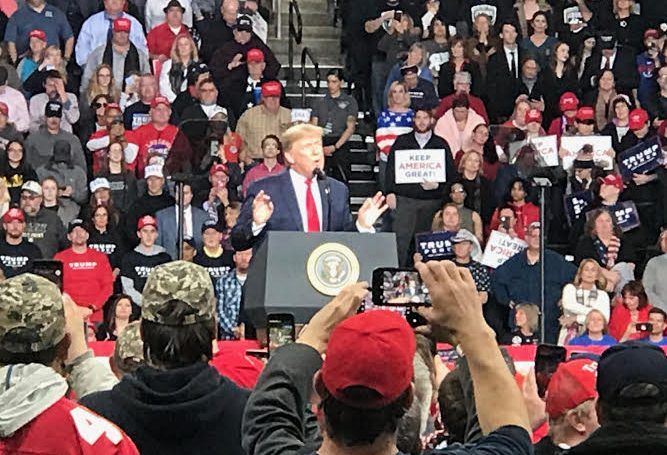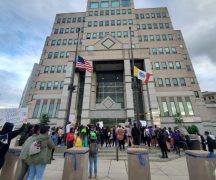Add Ohio Gov. Mike DeWine to the list of Republican officials who say the will of the voters will be respected in November while declining to condemn President Trump for refusing to say the same thing.
Trump was asked Wednesday in a press conference if he would commit to a peaceful transfer of power in January regardless of the outcome of the election.
“We’re going to have to see what happens,” Trump said in response. “You know that I’ve been complaining very strongly about the ballots. The ballots are a disaster.”
Pressed, he said, “Get rid of the ballots and we’ll have a very peaceful… There won’t be a transfer, frankly. There’ll be a continuation. The ballots are out of control. You know it. And you know who knows it better than anybody else? The Democrats know it better than anybody else.”
The peaceful transition of power between one president and the next has been the foundation of American democracy since George Washington was sworn into the office in 1789. The concept was particularly poignant when John Adams was sworn in eight years later because Washington could have used his godlike status to declare himself president for life.
But when Trump, who is trailing in the polls, declined to say he’d honor that principle, most Republican officials responded by saying the will of the voters will be honored — while avoiding direct criticism of Trump.
DeWine added himself to that list Wednesday.
Asked about Trump’s statement and his ongoing attempts to undermine faith in mail-in balloting, DeWine reviewed bitter elections of the past.
“Whatever the situation, however hotly contested each race is, however riled up everybody is on each side — and we’ve had those throughout our history — when the results are in, people accept them,” DeWine said.
DeWine and Lt. Gov. Jon Husted, the state’s former top elections official, also again tried to reassure voters that the state’ voting system is bipartisan and fair. But the governor didn’t respond to the part of the question asking whether Trump’s many criticisms of mail-in voting might undermine faith in the election.
Pressed on whether he specifically condemned Trump’s refusal to say he’ll accept the results of the Nov. 3 election, DeWine, a Trump campaign Ohio co-chair, declined.
“I don’t condemn anything,” DeWine said. “I don’t know what’s in his heart or in his mind. And anybody who runs for president wants to win and they’re going to fight. They’re going to fight all the way through to the end. But without exception, I believe, throughout American history, the loser — once it’s determined that you are the loser — concedes and then we move on. That will happen whoever loses this election.”
***
Before limiting ballot drop boxes, Ohio election officials secretly consulted promoter of debunked voting fraud fears
This story was originally published by ProPublica. ProPublica is a nonprofit newsroom that investigates abuses of power. Sign up to receive their biggest stories as soon as they’re published.
After Black union workers petitioned the state for more secure ballot drop boxes, a top Ohio election official called Hans von Spakovsky, a leading purveyor of discredited voting fraud claims, and then put a strict limit on the boxes instead.
On July 15, a civil rights group formed by Black union workers called on the Ohio secretary of state to make voting amid the pandemic easier and safer. It advocated placing multiple secure ballot drop boxes in counties across the state.
When a deputy to Republican Secretary of State Frank LaRose received the A. Philip Randolph Institute’s press release, he responded quickly — but not to the group. Instead, according to records obtained by ProPublica, the deputy contacted the Heritage Foundation’s Hans von Spakovsky, a leading advocate for the discredited argument that American elections are tainted by widespread voting fraud.
“I just left a voicemail at your office, but wanted to follow up via email as well,” wrote Grant Shaffer, the deputy assistant secretary of state. “If you have a few minutes, I’d love to discuss the attached press release.” READ MORE
Young Ohioans excited to cast first presidential ballot in unusual pandemic year
Since he was a little kid, Benjamin Mudrak has looked forward to casting his first ballot for president.
He envisioned a trip to the polling place on Election Day, casting his ballot and getting the “I Voted” sticker at the end.
After many years of waiting, the pandemic changed Mudrak’s plans. The Kent State University student lives at home with his parents and fears a trip to the voting booth might bring the virus back with him.
Though disappointed, Mudrak requested an absentee ballot and plans to vote by mail.
2020 is an unusual election season for many young Ohio voters who are casting their first-ever General Election presidential ballots amid a pandemic.
The Ohio Capital Journal heard from a half-dozen voters living throughout the state who have spent time in recent weeks researching how they will vote — not just picking candidates, but determining the safest way to vote given their unique circumstances. READ MORE





